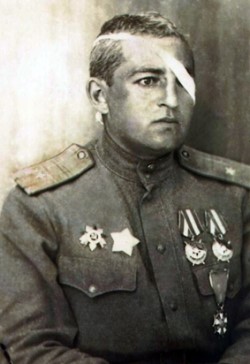Iosif Rapoport was born in 1912 in Chernigov, Ukraine His father was a doctor. In 1930, Iosif enrolled in the faculty of biology at Leningrad University. In 1938 he defended his kandidat thesis in the field of genetics. His scientific advisor was the renowned Russian biologist Nikolai Koltsov. Rapoport became a senior researcher at the Institute of Experimental Biology in Moscow, which had been founded and was headed by Koltsov. At the same time Rapoport was the komsorg, head of the Komsomol (the Young Communist League) organization of the Institute. In 1939, when the official harassment of Koltsov began (which was followed by his arrest by the NKVD), Rapoport was the only worker at the Institute who attempted to defend his mentor. During a general meeting of the Institute staff (attended, of course, by members of the NKVD), at which every speaker condemned Koltsov, Rapoport declared that all the accusations against Koltsov were unfounded and proposed that, instead of being castigated, the leading scientist have the Institute named after him. The results, however, were quite different: Koltsov was dismissed as the director of the Institute (and died shortly afterward from a heart attack soon after his interrogation by the NKVD); Rapoport was dismissed from his position as komsorg.
In June 1941, Rapoport was supposed to defend his doctoral thesis. However, after the German attack on the USSR, he put his thesis aside and, despite his exemption, he volunteered to join the Red Army. He began as the commander of a platoon, and was later promoted to the position of chief of staff of the 184th Regiment. Later he was sent to the front as a battalion commander He ended the war with the rank of lieutenant-colonel. In 1943, when Rapoport was sent to a commanders' course at the Frunze Military Academy in Moscow, during his stay in the city he succeeded in defending his doctoral thesis in genetics. He was seriously wounded twice. The second time, in December 1944, he lost one eye, but refused to be demobilized. Rapoport ended the war in May 1945 in Germany.
Rapoport was recommended for the honor of Hero of the Soviet Union three times, but all three times the recommendation was rejected. In addition to the disadvantage of his Jewish origin, his rejection was apparently due to the fact that Rapoport was a dissenter all his life, both in the academy and in the army. He violated orders received from his superiors three times. The first time was in the fall of 1943, during the forcing of the Dnieper River. In direct violation of an order, Rapoport shifted the location of his battalion one kilometer to the left. He replied to the commander of the regiment: "I won't sent my soldiers against machine-guns. We will capture the enemy position from the flank." The commander threatened Rapoport with a court martial. Rapoport replied: "You can do so if I am still alive". His battalion forced the Dnieper and captured the enemy positions with minimal losses. Rapoport was not put on trial but he was not awarded the title of Hero of the Soviet Union. The most interesting case involving him was the third, in December 1944, when Rapoport and his battalion were fighting in Hungary. There his battalion prevented the blowing up of a bridge and took over a Hungarian town located on the far side of the bridge. During this operation, his battalion advanced 20 kilometers ahead of the main forces. Since this was dangerous, the commander of his regiment ordered him to retreat, but Rapoport refused to follow the order and prepared his battalion for the imminent German counter-attack. His men captured a supply of German Panzerfausts, and with these bazookas, Captain Rapoport's battalion succeeded in halting the German tank attack. After this battle, he was awarded the Order of the Red Banner, his second, but not the title of the Hero of the Soviet Union. Thus, Rapoport received the order of the U.S. Legion of Merit order, a Hungarian military order, two Orders of the Red Banner, but not the highest Soviet military award.
As a scientist, Iosif Rapoport was the first (before Charlotte Auerbach) to discover chemical mutagenes. He was an outspoken opponent of the "Lysenkoism" – the neo-Lamarckist doctrine of Trofim Lysenko, a pseudo-scientist charlatan and a favorite of Stalin's. Lysenko conducted a campaign against "bourgeois genetics," and many Soviet geneticists fell victim to it. In August 1948, during the decisive "battle" between the geneticists and Lysenkoists held at a meeting of the Agricultural Academy in Moscow, Rapoport argued against Lysenko's main ideologist Professor Isai Prezent (also a Jew). Following this session, he was expelled from the Institute and the Communist Party. Rapoport was partly rehabilitated in 1957. He died in Moscow in 1990.

